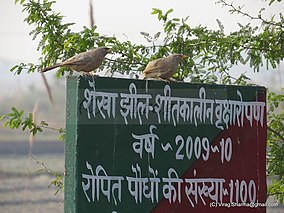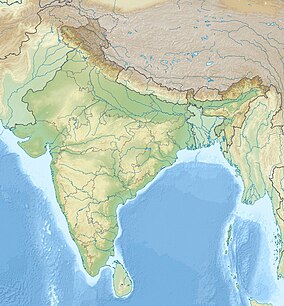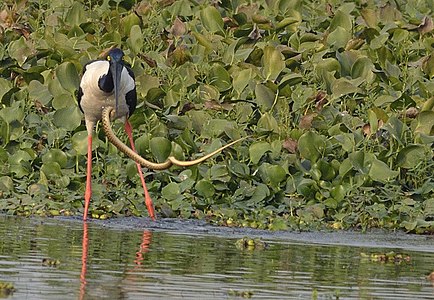| This article includes a list of references, related reading, or external links, but its sources remain unclear because it lacks inline citations. Please help improve this article by introducing more precise citations. (May 2021) (Learn how and when to remove this message) |
| Shekha Bird Sanctuary | |
|---|---|
 | |
 | |
| Location | Aligarh district, Uttar Pradesh, India |
| Nearest city | Aligarh |
| Coordinates | 27°51′21″N 78°13′06″E / 27.8557108°N 78.2184556°E / 27.8557108; 78.2184556 |
| Created | 2009 |
| Governing body | Uttar Pradesh Government |
Shekha Bird Sanctuary is a bird sanctuary at a 25 ha (62 acres) lake near the village of Shekha, 17 km (11 mi) east of Aligarh and 5 km (3.1 mi) from the Grand Trunk Road (GT Road) in the state of Uttar Pradesh, India. It is notable for birding as many birds overwinter there.
It is a fresh water perennial water body that came into existence after the formation of the Upper Ganges Canal in 1852 which flows adjacent to the lake. It is maintained by the Forest Department.
The best time to visit is between November and February. Starting January 2015, there is a cost of ₹10 for visitors.

List of birds
- Black-necked stork
- White ibis
- Spoonbill
- Greylag goose
- Bar-headed goose
- Lesser whistling teal
- Ruddy shelduck
- Northern pintail
- Common teal
- Indian spot-billed duck
- Sarus crane
- Asian openbill stork
- Red-breasted flycatcher
- Black- necked stork
- Wooly-necked stork
- Common Pochard
- Ferruginous Duck
- Ferruginous Duck
- Baer's Pochard
- Tufted Duck
- Indian Peafowl
- Common Quail
- Black Francolin
- Gray Francolin
- Little Grebe
- Asian Openbill
- Woolly-necked Stork
- Black-necked Stork
- Little Cormorant
- Great Cormorant
- Purple Heron
- Cattle Egret
- Indian Pond-Heron
- Black-headed Ibis
- Red-naped Ibis
- Eurasian Spoonbill
- Black-shouldered Kite
- Egyptian Vulture
- Booted Eagle
- Bonelli's Eagle
- Shikra
- Black Kite
- Egyptian vulture
Gallery
See also
References
- Official Website Of Uttar Pradesh State Tourism Development Corporation Ltd
- Patna Bird Sanctuary
- Sheikha Jheel case study - Kalpavriksh
- India Nature Watch


